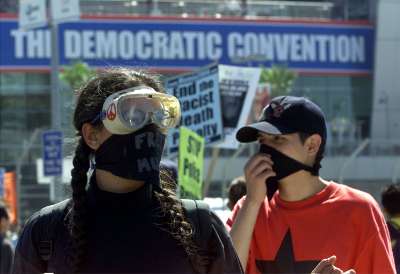 Drunk on beer and the power of our votes in this bizarre election cycle, my friends and I have spent an inordinate amount of time discussing the moments when the Democratic Party failed us. For one woman it was the Democratic Convention in 2000, when protesters were hauled into a chain link pen, Rage Against the Machine spoke out against the two-party system, police brutality was rampant, and the national media (as well as the Democratic Party itself) was so embroiled in corporate and “political” interests that an independent media organization was founded simply to report the other side. That was the most dramatic example, but all of us had moments of letdown, sadness, and anger. Among friends, these were little coming-out stories; as one woman put it, “that was when I was radicalized forever.”
Drunk on beer and the power of our votes in this bizarre election cycle, my friends and I have spent an inordinate amount of time discussing the moments when the Democratic Party failed us. For one woman it was the Democratic Convention in 2000, when protesters were hauled into a chain link pen, Rage Against the Machine spoke out against the two-party system, police brutality was rampant, and the national media (as well as the Democratic Party itself) was so embroiled in corporate and “political” interests that an independent media organization was founded simply to report the other side. That was the most dramatic example, but all of us had moments of letdown, sadness, and anger. Among friends, these were little coming-out stories; as one woman put it, “that was when I was radicalized forever.”
The role of the radical left in any election year is an awkward one, with people forced between a different “lesser of two evils”: vote for the candidate that you truly believe in (if there is one), or vote for whatever centrist the DNP has decided to sponsor in hopes of beating the Republicans. It’s a struggle that I became aware of in the first election I could vote in, and also (I now realize) my moment of radicalization. I was shocked as people attacked Nader voters, blamed them for Gore’s defeat, espoused “the good of the country.” As young and politically naïve as I was, I recognized the problem of the two-party system and the corporate machinations of the Democratic Party.
Until we start to support outsider and non-party candidates, that system cannot change. And maybe it will never change, but isn’t hope what fuels so many of us in an election year? Despite the lovely signs in so many Iowans front yards, the real candidate for “hope” (a word often associated with “peace”) is Dennis Kucinich.
Kucinich, as you’ve probably heard, is not electable. This is the line given to us by news sources, the same sources that inexplicably shut him out of a recent Iowa debate. It’s probably true, and I will caucus for him anyway. Oh, I know: my vote is taking away from the other, more important cause of electing “________.” My vote shows a hopeless naïveté about how the political process works. My vote is worthless.
Well, I think a worthless vote still counts for something.
In these twisted and important times, when both of our political parties have failed us so completely, I think that voting for a loser who you believe in says a great deal. And if you can’t even find a loser to like—and I’m sure some of you can’t—then why not stay home? Not voting is the most “worthless” vote of all. The politics of nonvoting, like the defiant act of “doing nothing,” is something that has a long history in our country, from the Amish to the abolitionists. Get some friends together, have a few bottles of wine, and refuse complicity with the state apparatus. I’m being smug, but I’m serious: I think informed non-voting is a legitimate form of protest.
I recognize that voting is important, so more of us should do it with what we look for in a candidate: honesty. I understand that many people who are various degrees left-of-center are drawn to candidates who they believe in and who they think can genuinely change America. One of those candidates is Barack Obama, who I will certainly caucus for if Kucinich becomes nonviable in my precinct (something that Kucinich himself supports). My point is not to convince you to support Dennis Kucinich (I haven’t even talked about the issues), but to implore my fellow leftists and liberals and radicals to remember that voting (or nonvoting) might be the most powerful action we have left. To eliminate choices and silence opinions stands for everything that we purport to stand against.
0 Responses to “Editorial: On “Electability””